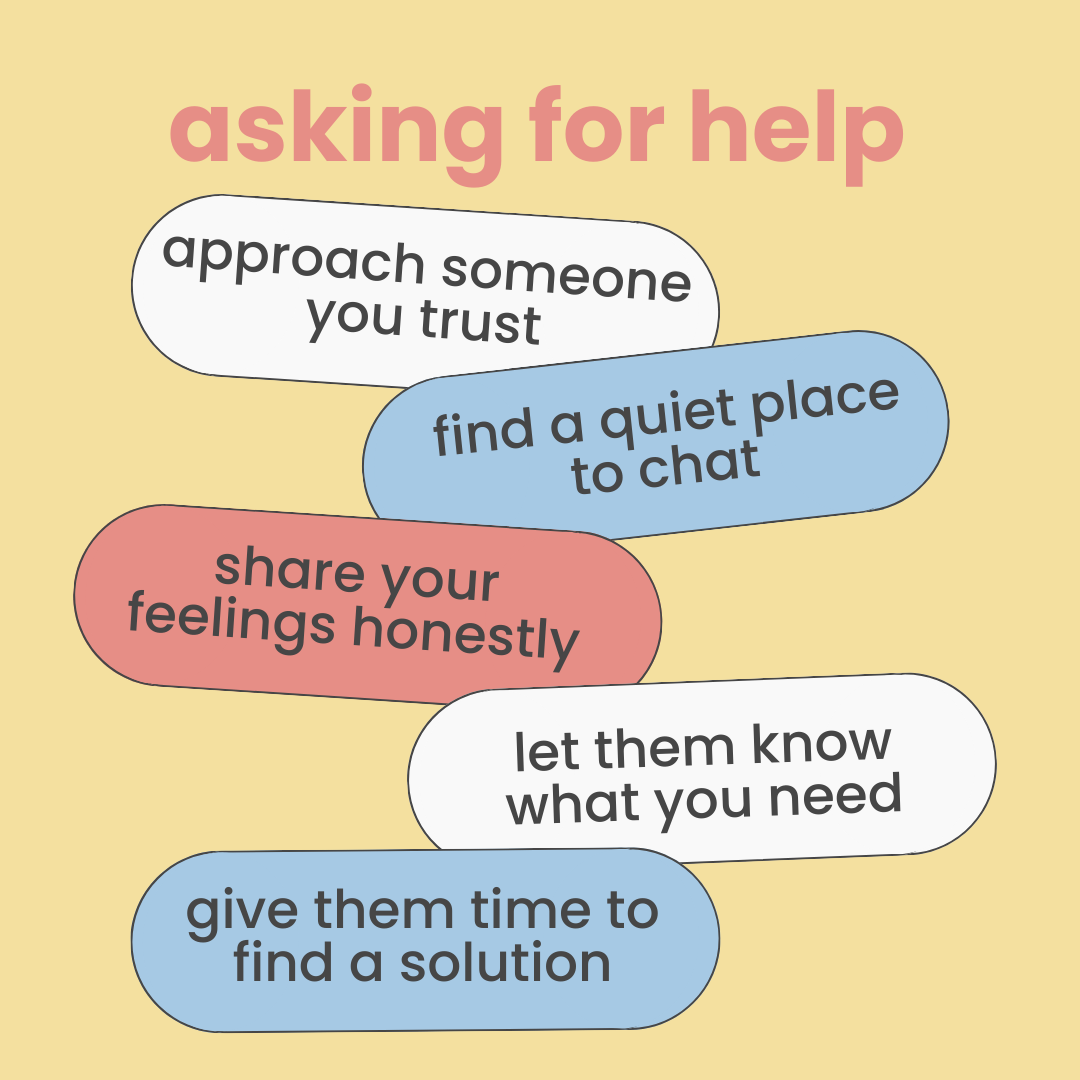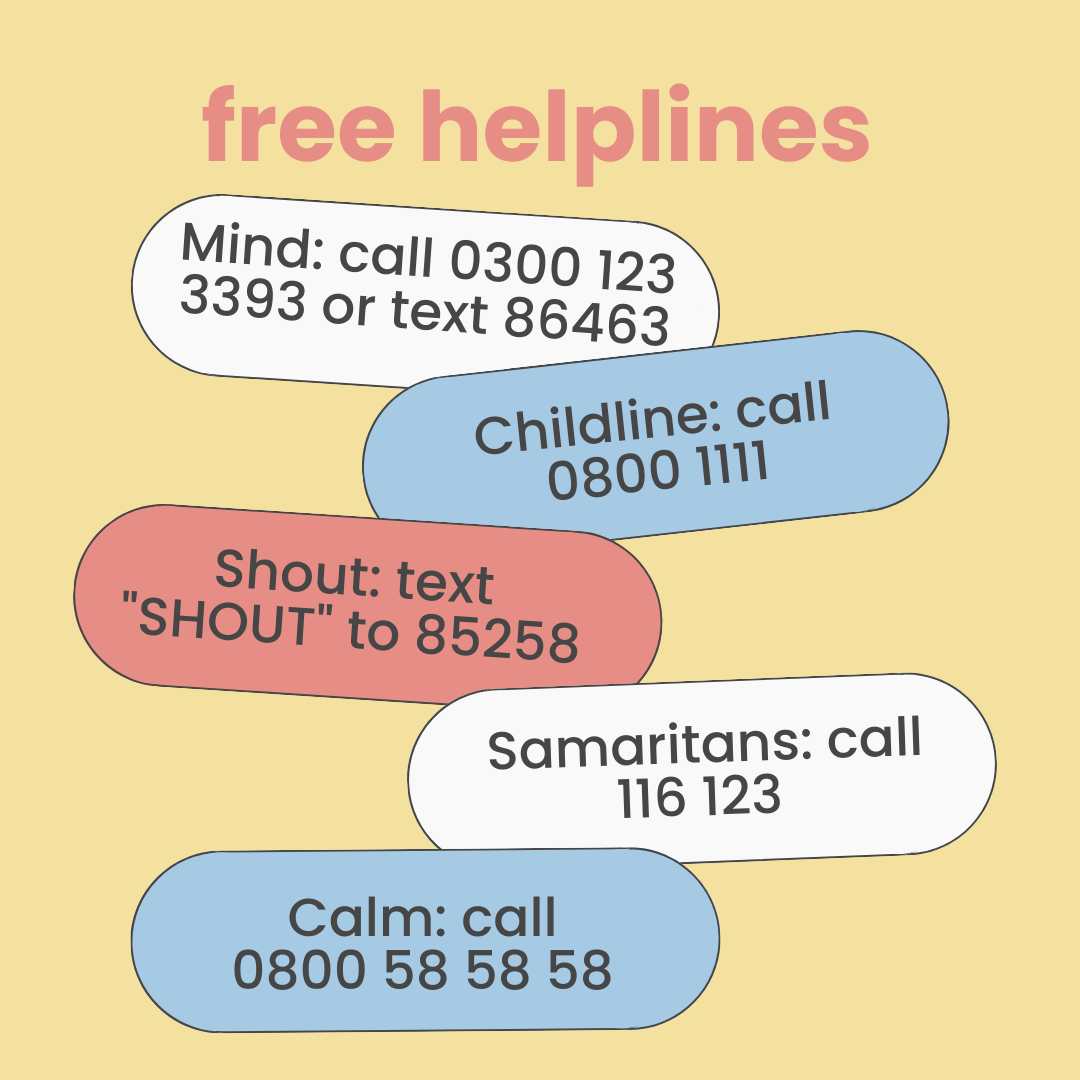
How to ask for help when you need it
What to say and how to say it 🗣️

Quick summary 📝
1️⃣ If you’re feeling down most or all of the time, seeking help is a smart and brave thing to do
2️⃣ To ask for help, approach someone you trust, find a quiet place to chat, share your feelings honestly, and give them time to find a solution
3️⃣ There are also lots of services available if you aren’t ready to speak to someone you know, for example Mind, Childline, Shout, Samaritans, Calm
4️⃣ The most important thing to remember is you are not alone, and there are people who can support you in whatever you’re going through
--------------------------------------------
We all go through struggles, but when they really get out of hand it's really important to seek help 💙 Whether you're facing problems with school, friends, or your own feelings, if these problems are making you feel down most or all of the time, seeking support is a smart and brave thing to do 💯
Whilst every situation is different, below are some general pointers to help you approach this conversation.

Step 1: initiate the conversation 🗣️
The first step in asking for help is to talk to someone you trust, like a parent, guardian, teacher, or a close friend 💬 It can be scary, but remember, they care about you and want to help.
Some things you could say are:
- “I’d like to chat about something that’s been on my mind – could we make time soon to have this conversation in private?”
- “I’m going through something personal and I need your advice – would you be free to have a chat soon?”
- “I’ve got something I want to discuss in private that’s been making me feel embarrassed/worried/anxious – is this something we can arrange?”
Step 2: choose the right time and place 🏞️
Find a quiet, comfortable spot to chat 🤫This way, you can have a real heart-to-heart without interruptions or distractions.
The kinds of spaces these could be are:
- From the comfort of your own bedroom (if a friend/family member)
- A quiet corner in a local coffee shop
- Walking around a park or sitting on a park bench
- A teacher’s office (if a teacher/member of school staff)
Step 3: be honest and open 🤗
When you talk to someone, be honest about what's bothering you. Share your feelings, and don't be afraid to say you're struggling. It's okay not to have all the answers 💯
Some ways you can open up are:
- I've been feeling…e.g. "I've been feeling a bit overwhelmed lately"
- Lately, I've noticed that...e.g. example: "lately, I've noticed that my mood has been consistently low"
- I wanted to talk to you about...e.g. "I wanted to talk to you about some challenges I've been facing"
- I'm struggling with...e.g. "I'm struggling with anxiety, and I thought it would be helpful to discuss it with you"
- I find myself thinking a lot about...e.g. "I find myself thinking a lot about my future, and it's been causing me some stress"
- I'm not sure how to handle...e.g. "I'm not sure how to handle my emotions lately, and I thought it would be good to get your perspective"
- I could use some support with..."I could use some support with managing stress; it's been affecting my well-being"
- I've been having a hard time with...e.g. "I've been having a hard time with self-esteem issues recently"
- I'm reaching out because...e.g. "I'm reaching out because I need someone to talk to about what's been going on in my life"
- I don't have all the answers, and I'm...e.g. "I don't have all the answers, and I'm struggling a bit. Can we talk about it?"
Step 4: ask for what you need 🤔
Tell the person how they can help you 🗣️ Whether it's advice, a listening ear, or a hug, let them know what you're looking for.
Some examples of what you could ask for are:
- "I could really use some advice on managing stress. Do you have any strategies or tips that have worked for you in the past?"
- "Right now, I mostly need someone to listen. Can we talk about what's been going on in my life, and you just be there for me?"
- "I'm feeling a bit overwhelmed, and a hug would mean a lot to me. Are you comfortable with that, or is there another way you think you could offer support?"
Step 5: be patient ⏳
Sometimes, it might take a little time for the person you're talking to understand your situation fully 💭 Be patient, and give them the chance to absorb what you've shared so they can help you in the best way possible.
Step 6: keep talking 🔁
Even after you've asked for help, don't be afraid to keep the conversation going 🗣️ Updates and check-ins with the people supporting you can make a big difference 👋
Finally, it’s important to seek professional help if you need
If you're going through something big and feel like you can't talk to friends or family, it's okay and important to reach out to a professional, like a school counsellor ❤️They're trained to help with tricky things.
There are also lots of great organisations who can offer information and support 📱Such as:
- Mind: call 0300 123 3393 or text 86463 (9am to 6pm on weekdays)
- Childline: call 0800 1111 – the number will not show up on your phone bill
- Shout Crisis Text Line: text "SHOUT" to 85258 to contact the, or text "YM" if you're under 19
- Samaritans: call 116 123
- Calm: call 0800 58 58 58 (5pm–midnight every day) or try the webchat service

The most important takeaway here is that you aren’t alone – asking for help doesn't mean you're weak 🙅♀️In fact, it takes strength to admit you need it. We all do at some point 🤷♀️
While waiting for help or while getting support, don't forget to practise self-care – do things that make you happy, like hobbies, exercise, or talking to other friends 🌱Self-care helps you feel better while you're working things out ❤️🩹

